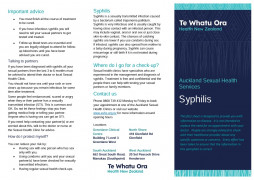About 50% of people don't get any symptoms and would not know they have it without having a blood test. People without symptoms can still get problems later on if they're not treated and can still pass the infection on to their sexual contacts.
For those who do get symptoms, syphilis is divided into 3 stages: primary, secondary and tertiary.
- Primary and secondary syphilis are also known as infectious syphilis.
- Tertiary syphilis is known as non-infectious or late-latent syphilis.
Primary syphilis
The first sign of syphilis is a sore, usually on your genitals but it may also appear on other parts of your body where there has been sexual contact. The sore may be hidden in your cervix, mouth or anus and because it is usually painless it may go unnoticed.
The sore usually appears 3 to 4 weeks after infection, but sometimes it takes longer. It disappears without you doing anything within a few weeks.
- Even though the sore heals, you still have the syphilis infection and can pass it onto others.
- Any genital sore must be examined by a doctor, even if it starts to heal and is small and painless.
Secondary syphilis
Sometimes a rash appears quite suddenly about 6 weeks after infection. It may appear on your body, face, arms and often on the palms and soles of your feet.
The type of rash and how large it is varies from person to person and even on different parts of the body of the same person. It may be very obvious but it may be so mild that you don't notice it. It rash lasts up to 4–6 weeks and often disappears as suddenly as it appeared.
There may also be 1 or more of the following symptoms:
A person in the primary or secondary stage of syphilis is very infectious because the sores and rashes are full of syphilis bacteria. There is a very high chance of infecting a sexual partner.
If syphilis isn't treated in the primary or secondary stages, the symptoms will disappear but you can remain infectious for up to 2 years.
Tertiary syphilis
If not treated, a small number of people will get late stage syphilis (or tertiary syphilis), which can cause damage to your heart, brain, nerves, blood vessels, liver, bones and joints many years later.
Treatment is still effective and can prevent further damage, but will not repair any damage that has already taken place. Tertiary syphilis is not infectious and can be avoided by treatment at an earlier stage.









